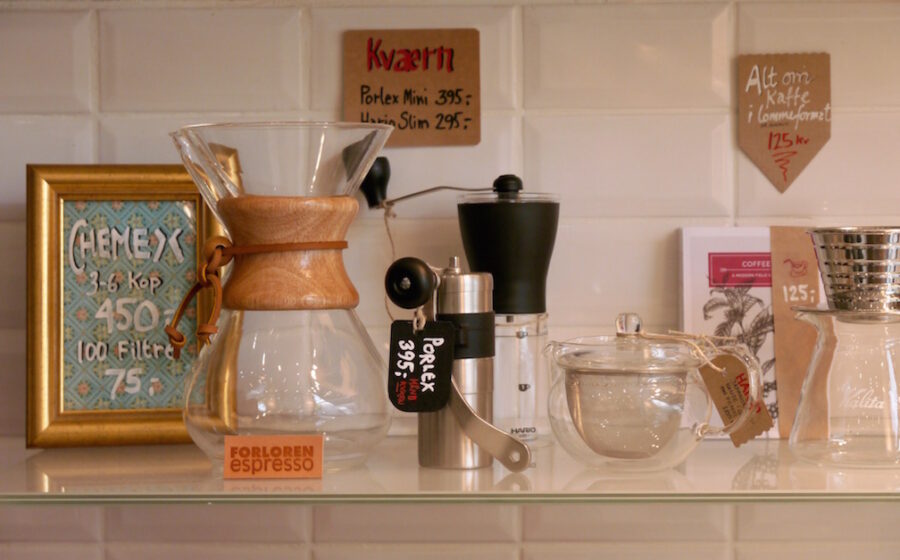[I]n our June Coffee Almanac we offered a caffeinated map, a snapshot of Copenhagen’s coffee scene. But for a city replete with sleek, Nordic nooks, we had to keep our explorations brief, focusing on the number of City Center shops that would fit in our annual coffee-devoted issue, though fully planning to explore more of the city’s roasteries, baristas, and outskirt cafés at a later date.
Forloren Espresso is a relatively new but already established espresso bar founded in 2014 by Niels H.S. Nielsen, who developed an interest for specialty coffee while in Japan. Nielsen works the bar in the small shop, which reflects his passions with shelves of hardbound photography and coffee books, Japanese magazines, and brewing wares to peruse while he prepares each coffee to order. A limited amount of comfortable seating makes Forloren a great place to grab a fast drink or window-watch Store Kongensgade street, which runs through the city. Nielsen answers our questions about the shop and its place in Copenhagen, below.

When and why did you open Forloren?
In 2013 I quit my corporate job to work towards opening Forloren Espresso in early 2014. I wished to contribute to the breadth of the Copenhagen coffee scene. Prior to that, during some years in the late ’00s, I lived in Tokyo, and enjoyed the established kissaten culture, as well as the emerging interest in specialty coffee. I was very fascinated by the Japanese ability to make small shops highly personal, both with regard to service and interior. When looking at Copenhagen from Tokyo, it struck me how little diversity I could see in the coffee scene and how relatively few shops showing personal dedication there were in this landscape. This triggered the idea behind Forloren Espresso.
“I was very fascinated by the Japanese ability to make small shops highly personal, both with regard to service and interior.” —Niels H.S. Nielsen
What is your personal history in coffee?
I have been a coffee lover since the early eighties, but didn’t think much about the finer aspects of quality until I tasted distinctively better coffee from a few Copenhagen cafés in the early ’00s. It eventually took a few skillful baristas in various memorable settings in Tokyo to make me want to create a small coffee spot in Copenhagen.
In 2013 I decided to quit my job to open Forloren Espresso as a personal project. So far it has been a one-person-shop and the journey has been immensely satisfying and educational. I have found the Copenhagen coffee community extremely willing to share knowledge and support my project.

How do you determine which beans you will serve?
I personally love skillfully roasted, distinctly fruity and juicy coffees, but I take a non-dogmatic approach in choosing from the selection of amazing coffees from UK roaster Has Bean and La Cabra Roasters from Aarhus, Denmark. I try to create a small selection on my coffee menu that ranges from comfortable, medium roasted beans with chocolaty and toffee notes to more demanding light roasted beans with flowery and fruity notes and distinct acidity—often associated with Scandinavia. This gives my customers a space to explore different sides of specialty coffee.

I have a little selection of pastries from the Japanese Andersen Bakery. The founder of the bakery, Shunsuke Takaki, learned to bake Danish pastries in the late fifties in Denmark, brought the skill back to Japan and refined it over more than fifty years. His children decided to open a few shops in Denmark—and I am glad they did; Andersen Bakery has basically reinvented and lifted Danish pastry up to the quality level where it deserves to be.
How has café culture grown or changed in Copenhagen in recent years?
I am an outsider in this environment and don’t really feel I can say something meaningful about the café scene, but it is my personal impression that customers are much more interested in specialty coffee compared to a few years ago, it’s growing almost explosively. I think the work of the good people at the Coffee Collective should have some credit for that.
It also seems to me that cafés which have a unique, quality approach are rewarded. Quality and diversity is definitely up since I first started thinking about opening Forloren Espresso, but there is still room for more cafés with a unique approach to quality and atmosphere.
—Regan Crisp is Fresh Cup’s associate editor. Photos courtesy Forloren Espresso.
















